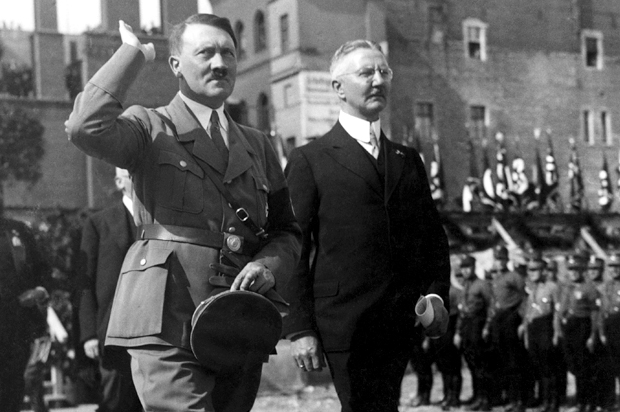Hjalmar Schacht wrote after the war about his high regard for the economic policy of the first four years of Hitler’s rule, in which he had played a key role, when deficit spending was used to create jobs and increase production, without generating inflation.
Schacht was critical of the period from 1937 forward. The problem with Hitler’s deficit spending in that later period, according to Schacht, was that Germany had already reached full employment. The theory is that for as long as deficit spending corresponds to increases in employment and production, it is not inflationary. But once full employment has been achieved, further deficit spending cannot produce further employment, and therefore will be inflationary.
But accelerated rearmament, however it might be funded, had become indispensable because of the threat posed by growing Soviet military might and the Franco-Soviet Mutual Assistance Pact.
In the program posted here there are about 20 minutes of lecture about Hjalmar Schacht’s relationship to Hitler’s agenda, followed by 20 minutes of discussion.
The discussion seemed mostly to go in circles, orbiting around two questions: (1) whether an increase in the supply of money necessarily causes inflation and (2) whether inflation consists in an increase of the money-supply or (as Hitler says) in a rise in prices that might result therefrom.
By all accounts Hitler’s accelerated rearmament of Germany through deficit spending beginning in 1937 did not seem to produce inflation (as Schacht had predicted) while Hitler’s government still existed.
This avoidance of inflation was accomplished through what one foreign commentator called Hitler’s “bag of economic tricks” (Free Lance-Star, 29 April 1938). Among these “tricks” was deterrence of speculation, since hoarding of goods in anticipation of selling them at a higher price (on the black market) tends to force the prediction of a price-rise to come true. Another trick was mandatory loans to the government, which allowed the government formally to issue payments without actually having the money in circulation. Public loyalty and confidence in Hitler must have been a crucial factor in enabling all of this to work. In the late 1930s there was a demand that Germany’s overseas colonies be returned (which was, for example, included in Hitler’s peace-offer of February 1940). This would have helped enormously with offsetting the deficit being generated at that time. By 1942 Hitler was intending to cover the deficit with minerals from conquered Soviet territory, but if Germany did not win the war, an unsound currency would be the least of her worries.
It seems legitimate to say that if the quantity of money only temporarily outstrips production without causing a change in the perception of that money’s value before the deficit is covered, then there was no inflation (which is to say, no devaluation). That is a justification of how Hitler used the word.
Schacht says that Hitler’s deficit spending caused inflation of the Reichsmark after the war, but really, how could he tell? The effects of Anglo-American bombing and postwar looting on Germany’s productive capacity surely overshadowed entirely any imbalance between currency and production caused by a few years of deficit spending.
Hitler’s position was this:
“The thing has got to be done. No State has ever gone bankrupt for economic reasons — but only as the result of losing a war!”[Table Talk, 22 April 1942]
It turns out that Schacht’s opposition to this accelerated rearmament was not entirely a matter of fiscal scruples. Schacht, with his connections in England and the United States, was bent on hindering Germany’s rearmament because he was disloyal. He admitted this in his book, The Magic of Money (1967).
An American diplomat, Donald R. Heath, wrote to Schacht in 1959 to inform him of how he had vouched for his collaboration with the U.S. government during the war:
I told [American prosecutor Robert] Jackson not only should you never have been brought before that tribunal but that you had consistently been working for the downfall of the Nazi regime. I told him that I had been in touch with you consistently during the first part of the war and Under Secretary of State Wells through me, and that you had passed on to me information adverse to the Nazi cause…. [D. Heath quoted by H. Schacht, The Magic of Money (1967), p. 107]
In any case, for purposes of assessing National-Socialism as such, it ought not to be forgotten that Schacht, an economist who placed supreme value on maintaining the stability of a currency, found the economic reality of National-Socialism quite praiseworthy prior to the period of accelerated rearmament that commenced in 1937.
